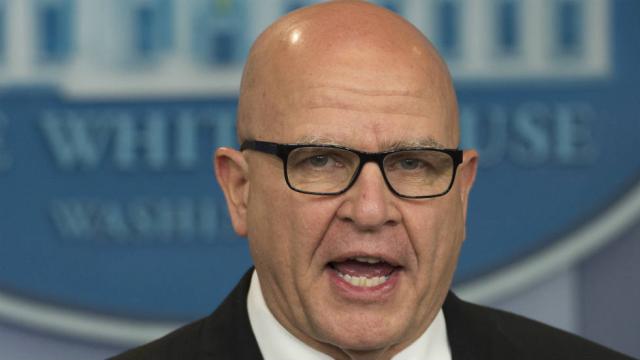Trump’s foreign policy approach out of ‘my comfort zone’: McMaster
NEW YORK, (MILLAT ONLINE):US National Security Adviser H.R. McMaster has said that President Donald Trump’s unorthodox approach to foreign policy was beyond his “comfort zone,” suggesting he has altered the global community’s view of the United States.
Trump’s approach to foreign policy “has moved a lot of us out of our comfort zone, me included,” McMaster, 55, a three-star Army lieutenant general who served in Afghanistan and Iraq, told The New York Times.
“The consensus view has been that engagement overseas is an unmitigated good, regardless of the circumstances,” he in the curse of a dispatch published Friday.
“But there are problems that are maybe both intractable and of marginal interest to the American people, that do not justify investments of blood and treasure.” McMaster defined Trump’s foreign policy as “pragmatic realism,” not isolationism.
The president has repeatedly attacked multilateral trade deals and other international agreements.
McMaster has advised Trump through several high-stakes situations during his first year, including nuclear provocations coming from North Korea, which the president has met with threatening rhetoric and demands that the country dismantle its nuclear programme.
McMaster has also supported Trump in taking firm stances against foreign entanglements such as the Iran nuclear deal, a holdover from the Obama administration.
He acknowledges the impact of the president’s “America first” stance on diplomacy.
“Some people have described him as disruptive. They’re right. And this is good” good because we can no longer afford to invest in policies that do not advance the interests and values of the United States and our allies,” McMaster said in May.
Trump has held more than 130 meetings and telephone calls with foreign leaders since taking office Jan. 20, the Times reports, though some foreign leaders still remain puzzled on how to deal with him.
“Most foreign leaders are still trying to get a handle on him,” Richard Haass, a top State Department official in the George W. Bush administration, told the Times. “Everywhere I go, I’m still getting asked: ‘Help us understand this president, help us navigate this situation.”
Haass is now president of the Council on Foreign Relations in Washington.
“We’re beginning to see countries take matters into their own hands,” he told the Times. “They’re hedging against America’s unreliability.”
Meanwhile, the Times dispatch commented, “Nearly a year into his presidency, Trump remains an erratic, idiosyncratic leader on the global stage, an insurgent who attacks allies the United States has nurtured since World War II and who can seem more at home with America’s adversaries. His Twitter posts, delivered without warning or consultation, often make a mockery of his administration’s policies and subvert the messages his emissaries are trying to deliver abroad.
“Trump has pulled out of trade and climate change agreements and denounced the 2015 nuclear deal with Iran. He has broken with decades of U.S. policy in the Middle East by recognizing Jerusalem as the capital of Israel. And he has taunted Kim Jong Un of North Korea as ‘short and fat,’ fanning fears of war on the peninsula.
“He has assiduously cultivated President Xi Jinping of China and avoided criticizing President Vladimir Putin of Russia” leaders of the two countries that his own national security strategy calls the greatest geopolitical threats to America.
“Above all, Trump has transformed the world’s view of the United States from a reliable anchor of the liberal, rules-based international order into something more inward-looking and unpredictable. That is a seminal change from the role the nation has played for 70 years, under presidents from both parties, and it has lasting implications for how other nations chart their futures.”
